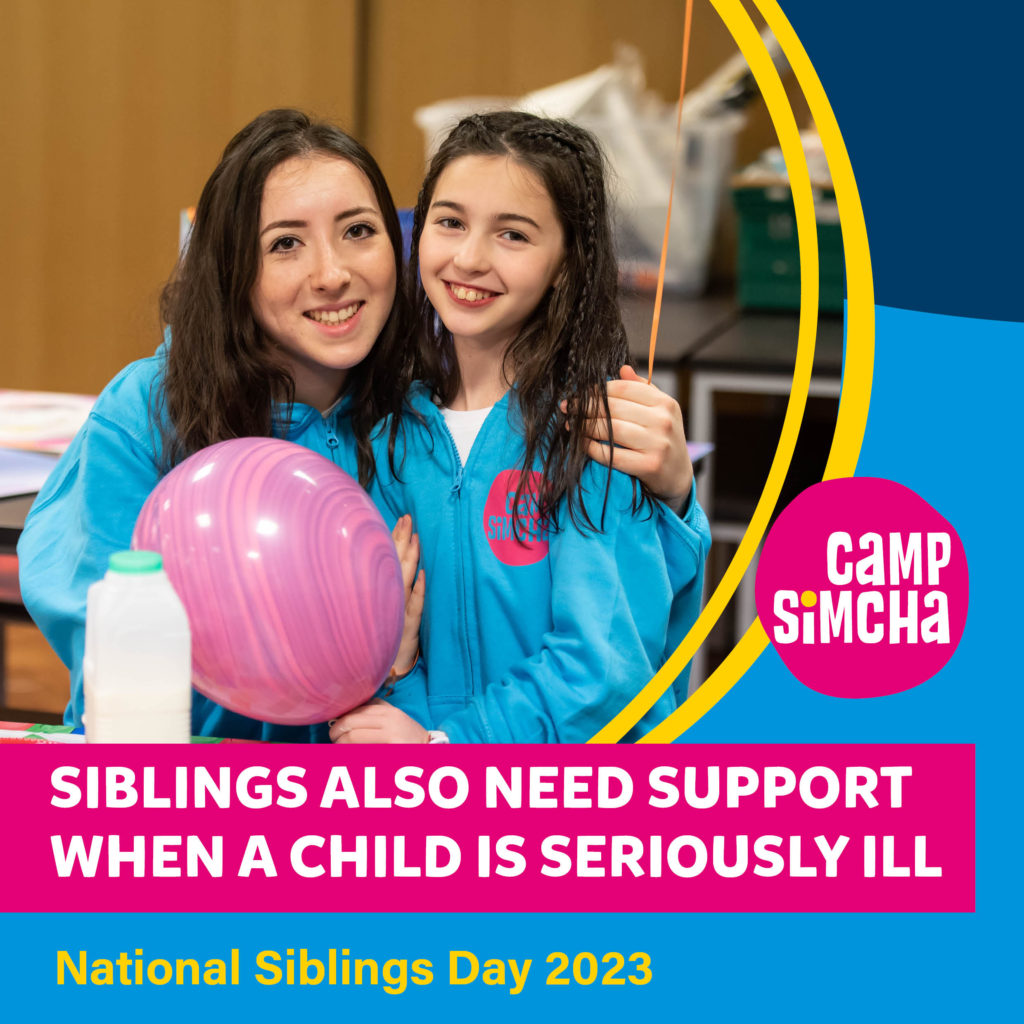


When a child has a serious illness, their siblings can sometimes be the forgotten sufferers – this is why we always focus on the brothers and sisters as well as the ill child at Camp Simcha.
Claire Franklin, a Clinical Psychology doctoral trainee, working with Camp Simcha has recently undertaken some research looking at the impact on siblings of having a seriously ill brother or sister. Here she shares her findings.
“It is clear at Camp Simcha, that siblings’ mental health is a priority. Family Liaison Officers tell me that they frequently discuss the siblings with parents – and that they express worries about their children’s wellbeing, and that many feel guilty that they can’t give the siblings as much attention as they would like to.
Sadly, they are right to be concerned. Studies in 2018 and 2020 found that having a sick sibling can increase the risk of:
Another study in 2022 asked a group of grown-up siblings to look back on their childhood and consider what it had been like, living as a sibling of a seriously ill child. They described an overwhelming sense of ‘self-censoring’. Siblings felt ignored a lot of the time and would have liked to have been able to talk about things so that their difficulties could be normalised and externalised. They expressed guilt and self-blame for not having been able to help their sibling enough, and they underwent a process of learning that as siblings of a sick child, they had also needed support.
The positive news is that research has shown that the right interventions improved siblings’ and other family members’ self-esteem, behaviour, mood, and quality of life.
These interventions included activities such as having fun; arts and crafts, relaxation techniques; team building; discussion-based activities; using role plays to teach coping strategies; psychoeducation (e.g., educating about the impact of challenges on one’s wellbeing); cognitive restructuring (i.e., thinking about things differently); emotion education; opportunity to talk about feelings; problem-solving/social skills activities, and building self-acceptance.
In another study, siblings themselves said they wanted to have a fun and supportive environment where they could meet other siblings who were in a similar situation to them. They liked having a break from home, an opportunity to talk things through, and enjoy group activities that built their confidence and self-esteem.
Our experience at Camp Simcha, as well as those of other organisations supporting siblings who have brothers or sisters with health issues or disabilities, mirrors many aspects of my research.
Existing services Camp Simcha offers, such as sibling groups, therapeutic arts, animal assisted therapy and their sibling retreat – are all designed to mitigate some of the issues that arise for siblings, and feed into the approach which research has shown can make a difference.
Camp Simcha’s sibling residential retreat, for example, offers siblings three concentrated days away from home – having fun, enjoying team-building activities, circle time and space to share experiences and peer support, as well as a break from some of the pressures of home life.
Siblings return home mentally refreshed, having enjoyed time and attention that was devoted to them and really value making friends who ‘understand’.
Meanwhile, Camp Simcha has supported some siblings to access equine therapy, which is designed to promote wellbeing and emotional resilience. Children interact with the horses, cleaning, exercising, feeding, and talking about the horses’ needs as a way of providing metaphoric experiences to help them gain understanding and acceptance of their own emotions. It is especially beneficial for those children who are unable to verbalise how they are feeling.
Camp Simcha is always looking for new ways to support its families. The research I have undertaken not only validates how crucial sibling support services such as these existing ones are; it will also help shape our programmes as they continue to evolve and grow.